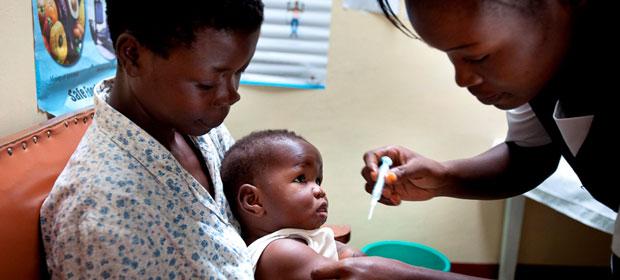Where We Work
See our interactive map


A new and diverse coalition of 15 major global health organizations—including IntraHealth International, the Bill & Melinda Gates Foundation, and Save the Children—is calling on the US government for more strategic investment in frontline health workers as the most cost-effective way to save the lives of mothers and children, address AIDS and other global health threats, and help advance US economic and strategic interests.
The Frontline Health Workers Coalition, which launched January 11th with an event and the release of a new report, is calling on the US administration to train and support an additional 250,000 new frontline health workers—and to better support the capacity and impact of existing workers where the need is greatest.
Frontline health workers are often the only link to health care for millions of children and their families in the developing world who live beyond the reach of hospitals and clinics. These workers—mostly community health workers and midwives, but also doctors and nurses who serve at the community level—can provide families with a range of proven, lifesaving services including maternal and newborn care, child health, and management of chronic and communicable diseases, such as tuberculosis, AIDS, and diabetes. Yet according to the World Health Organization, there is a global shortage of at least one million frontline health workers.
|
 We have an abundance of evidence that investing in health workers pays off. We have an abundance of evidence that investing in health workers pays off.Maurice Middleberg, IntraHealth’s vice president for global policy
|
IntraHealth International and 14 other global health organizations launched the Frontline Health Workers Coalition at the Kaiser Family Foundation in Washington, DC. More than 150 representatives of nongovernmental organizations, the US government, nonprofit organizations, and others participated in the event, which was moderated by Dee Dee Myers, managing director of the Glover Park Group and former White House press secretary for President Clinton.
Panelists included Dr. Ariel Pablos-Mendez, assistant administrator for global health at USAID; Anita McBride, former chief of staff to First Lady Laura Bush and a senior advisor at the George W. Bush Foundation; Dr. Peter Ngatia, director of capacity building, AMREF; and Duncan Learmouth, senior vice president of developing countries and market access, GlaxoSmithKline. IntraHealth President and CEO Pape Gaye gave closing remarks.
“At IntraHealth, we say that health workers must be present, ready, connected, and safe,” said Gaye. “Present where they are most needed, ready to provide high quality services, connected to information and communication technologies, and safe from threats to their lives and health. IntraHealth is honored to be a founding member of the Frontline Health Workers Coalition.”
“We have an abundance of evidence that investing in health workers pays off,” said Maurice Middleberg, IntraHealth’s vice president for global policy. “Making health workers available to communities in need will help ensure the enduring legacy of the US Global Health Initiative.”
In addition to IntraHealth, other members of the Frontline Health Workers Coalition include Abt Associates, AMREF, Family Care International, Bill & Melinda Gates Foundation, GAPPS (Global Alliance to Prevent Prematurity and Stillbirth), IAPAC (International Association of Physicians in AIDS Care), Jhpiego, Partners In Health, PSI, Public Health Institute, RESULTS, Save the Children, White Ribbon Alliance for Safe Motherhood, and World Vision.
Eight corporations are partnering with the Frontline Health Workers Coalition to help increase the number of trained health workers, improve retention rates among existing health workers, and enhance the capacity of existing health workers.



